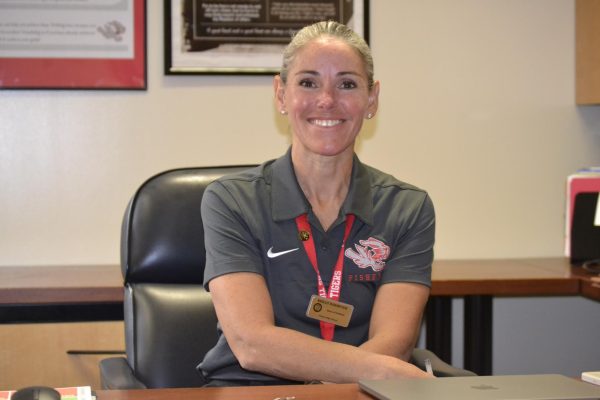Students share their voice in recent school board meeting
Citizens watch the school board moments before it announces its vote in favor of the policy change.
Hundreds of citizens showed up at Central Office on May 8 to support a revised edition of a new non-discrimination policy after the original edition was rejected in April.
In two weeks, the board’s initial decision drew criticism that ranged from district members to activist groups and Mayor Scott Fadness. At the meeting, around forty members of the public presented evidence and testimonials in support of the policy. Several FHS students numbered among them, and students as young as middle schoolers or a 5th grader joined them.
After the floor closed, the school board took a few minutes to address their primary concerns.
The board had limited time to prepare for the meeting. Revisions had been conducted just hours earlier, including a specific reference in the policy was changed from “gender nonconformity” to “gender identity.” Dissenting members of the board first voiced their concerns about what kind of precedent the proposed policy would set. They were concerned that by listing which specific categories of people deserved protection, they made any unmentioned group more vulnerable, and speculated that this precedent would lead to several other groups lobbying to have specific language added to the list. Two critics mentioned that people with eating disorders or low intelligence are not mentioned. However, both groups are legally classified broadly as disabilities, which are specifically mentioned in the text.
“By specifying particular groups of persons, this policy makes a statement that would be difficult to enforce,” Vice President Sylvia Shepler said. “As for example sexual orientation and gender identity are by their very definitions fluid and subjective. Maybe we should consider listing all the subcategories of religion. There are about 4,200 of them. These practiced faiths are all expression of religion just as all the different sexual practices are the expression of the sex category.”
N the Red has reached out to Shepler for further explanation of her comments but has yet to receive a response.
In its current form, the language of the policy does not specifically mention subcategories of any of the groups it references and therefore does not give any group an elevated status above another. Shepler’s comments at the previous board meeting were the subject of public attention after she referred to the LGBTQ community as “cool” and “popular.”
The biggest topic of debate was the inclusion of a conscience clause. Although the policy contained no reference to terminology, Shepler claimed that the policy would force “compelled speech” throughout the district by forcing people to treat marginalized groups differently than they otherwise would. As a result, the proposed conscience clause meant that someone objecting to a group on “personal, ethical, moral or religious grounds” does not form the basis for discrimination.
Critics of the clause argued that it offered too many exemptions and would make the policy as a whole completely useless. Ultimately, the board struck down the clause after a vote of 3-4.
The board made its final vote immediately after striking down the amendment. The overall policy passed with a vote of 5-2. Crowds scattered throughout Central Office’s main chamber and overflow rooms erupted in applause as they heard the news.
The vote was a victory for activist groups, but junior Mia Morales agreed with the board’s opinion: policy cannot do much to change things unless the district’s culture changes too.
“There are countless people doing their part,” Morales said. “Students are increasingly active in standing up for their beliefs and becoming more open-minded, teachers are sponsoring minority based clubs and including diversity in their lessons, administrators are partaking in programs such as Undoing Racism and Brave Conversations, parents and community members are engaging in racial dialogue circles and unifying over a cause that is vital to this district. We are not asking [the school board] to change the culture. We are changing the culture.”
The currently approved policy states,
“Hamilton Southeastern School Corporation will not discriminate or tolerate any form of discrimination in its educational or employment activities for any reason or on any basis prohibited by applicable federal and state laws, including race, color, religion, sex, sexual orientation, gender identity, national origin, age or disability. That includes but is not limited to a characteristic, trait, belief, practice, association or other attributes. Hamilton Southeastern Schools will foster a culture and environment that does not marginalize, treat unfairly or disrespect any member of our school community and will recognize the uniqueness and individuality of all students, educators, staff and administrators so they have an opportunity to succeed.
This commitment applies to all School Corporation operations, programs, and activities. All students, administrators, teachers, staff and all other school personnel share responsibility for avoiding, discouraging, and reporting any form of harassment or discrimination. This policy applies to conduct occurring on school grounds immediately before, during, or immediately after school hours; in any school program or activity taking place in school facilities, on school transportation, or at other off-campus locations, such as at school-sponsored field trips or a training program; or using property or equipment provided by the school, including school-0wned computers and the school’s computer network.
The immediate remedy for any act of discrimination shall be to end it, treat the individuals involved equitably, and, as much as practically possible, eradicate any effects of discrimination. The school corporation may impose discipline as appropriate.”

Ethan O'Sullivan is a third year writer on staff, and has served as the Web/News Editor for two years. He has a personal interest in data journalism and...






